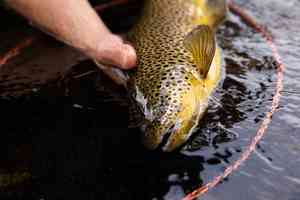At the intersection of passions there often lies magic. Overlapping devotions compound and exponentiate in weird and wonderful ways, lifting each to stimulating new heights. But, just as often, at those same crossroads lies madness and the sad truth is, when in the throws of passion, it’s hard to tell the difference between the two.
My love affair with fly fishing is well documented. But those who know me best are also aware that I have been recently consumed by another old flame. The guitar. I’ve owned a trio of acoustics for decades, sentimental pieces more than musical, but the fire was reignited with the purchase, last November, of a Fender Telecaster and Blues Junior amp (electrified devices, for those of you uninitiated in modern six-stringed instrumentation). Our quiet hide-away in the woods has become a little less quiet and a little less fishing has been going on.
And while the Telecaster has gotten the most attention, the increase in musical interest has blown back on my acoustics. I pick them up much more often now, especially when the urge to make noise surfaces and there’s too little time to set up the electric, or when Mary has the girls over and I must be sonically restrained.
Such was the case yesterday as Mary and Susan and Sherry were downstairs, working on their basketry. I picked up the quietest thing I owned, my Yamaha G-231 classical, a box that I hadn’t played in a while, and gave it a good strum. But, with that single rake of the pick, the top nylon E-string pinged at the bridge and I was down to five, the final string left hanging loosely from the headstock like some poor tenkara offering.
At that point, I could have easily set the Yamaha aside and picked up another guitar, but it’s not in my nature to leave things in such awkward states. My OCD won’t allow it. And a quick rummage in the case failed to produce the new set of D’Addarios that I was certain had been there. I had replacements for the Fenders, my steel-stringed acoustics, and a variety, 09s-to-11s, to try out on the Telecaster, but none for the 231’s nylons.
If the strings were not in the case, then they had to be in my toy closet—that cluttered hole in the wall filled with guitar accoutrements, camera gear, and all things fly fishing—and it was there that the passions overlapped. Once the nylon set couldn’t be found, my eyes fell on the carefully stacked boxes of fly lines.
Do you think...
I grabbed an old RIO bass line, a 7wt that I’d had for a while and was likely not to use again, cut out a four-foot length of running line and strung it up. It easily tuned to an E and I got a soft, mellow note, but it couldn’t be held for long. After a bluesy Stormy Monday, it went flat as a Lefty Kreh loop. And I didn’t like the feel of the textured line or the “round-wound buzz” that I got as I slid between notes. That sound’s okay down low, but not acceptable in the upper registers. A four-foot length of the tapered head faired a bit better and had a bit more warmth of tone, but also quickly lost tune after just two bars of an acoustic "Layla". That and it felt a bit bulky for the top end. All-in-all, the 7wt was unsatisfying, but the concept showed promise. A more scientific analysis was needed.
Tension was not an issue. Guitars are normally strung in the neighborhood of fifteen pounds tension and a fly line should handle that and more. I’ve broken off enough 20lb floro tippet on bonefish and reds to know that to be true. Size and texture were next to be considered and the possibilities that lay between 5wts and 8, especially when factoring in the tapers, would give me plenty of options. Perhaps a newer line would help address the tuning issue as well. But in the end it would all come down to tone. It’s all about tone.
So I started experimenting. I grabbed a fresh box, a RIO Outbound Short Freshwater 8wt intermediate sinking line, thinking the running weight would be about right. In addition, the untextured, slick finish should reduce the buzz and the sink line might add some weight for a fuller sound. I hacked a few pieces, strung them up, and saw improvement, but the tuning issue remained. One full play of "Down By the River" and it was flat again. Worse, the coldwater coating began feeling tacky as it warmed under my fingers. Great for avoiding coiling issues in cold weather. Bad for warm hands and hot licks.
A tropical line, then. Snipped up another Outbound Short, this time a 9wt intermediate, but with a saltwater coating. Better texture under my fingers and a decent tone, but the bothersome tuning issue remained. Didn’t hold up through "Day Tripper." Barely got through the intro. It was beginning to look like a show-stopper.
Another look into the closet and the light bulb went off. The lines' core was the key. If I could find a more stable core, perhaps it would hold. RIO’s low stretch ConnectCore might be the answer and I quickly took the scissors to a new 5wt Xtreme Indicator line. The running line proved a bit light, but a length of the head—the cool orange front taper—seemed closer. A rousing ten minutes of twelve-bar-blues jamming, bends not normally heard from an classical guitar, didn’t budge the tension an iota so the tuning issue was licked, but I’d lost the tone with the lighter line.
A 6wt InTouch Grand, then. The trimmed out green front taper wasn’t quite as cool, visually, but the tone was better. Not just better. Fantastic. Buddy Guy’s upper licks never sounded so good. Downright buttery.
I’d hit the sweet spot. Beautiful sound. Tuning stability. Silky feel. I’d solved my E string problem...
(with $400 worth of fly line)
… and wondered how fantastic it’d sound if I replaced the G and B strings as well.






























Comments